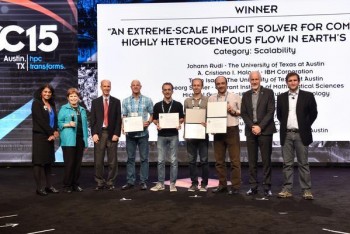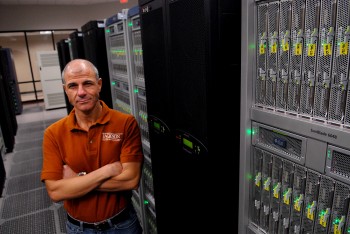Ghattas Wins Prestigious Super Computing Prize for Modeling Earth’s Mantle
November 20, 2015

Jackson School researcher Omar Ghattas and collaborators have won the 2015 ACM Gordon Bell Prize, super computing’s most prestigious prize, for a paper on high-performance modeling of the Earth’s mantle convection.
The $10,000 award was presented to Ghattas and others on Nov. 19 at SC15, an international super computing conference held in Austin this year.

Ghattas is the John A. and Katherine G. Jackson Chair in Computational Geosciences in the Jackson School’s Department of Geological Sciences, and the Director of the Center for Computational Geosciences and Optimization at UT’s Institute for Computational Engineering and Sciences (ICES). He conducted the research with collaborators from ICES, New York University, IBM, and the California Institute of Technology.
The team was awarded the prize for its paper “An Extreme-Scale Implicit Solver for Complex PDEs: Highly Heterogeneous Flow in Earth’s Mantle.” The paper describes high-performance computing methods that Ghattas and his team used to create a global model of the Earth’s mantle convection and associated plate tectonics. The resolution of the model is detailed enough to show activity at plate boundaries. The project’s abstract appears online along with conference details.
The Gordon Bell Prize recognizes the extraordinary progress made each year in the innovative application of parallel computing to challenges in science, engineering, and large-scale data analytics. Financial support of the $10,000 prize is made possible by Gordon Bell, a pioneer in high-performance and parallel computing. He is a past winner of the Institute of Electrical and Electronics Engineers Seymour Cray Award for his exceptional contributions in the design of several computer systems that changed the world of high performance computing (HPC).
Gordon Bell prize finalists are selected by a committee comprising past Gordon Bell winners, as well as leaders in the field of high performance computing. Solving an important scientific or engineering problem in HPC is important, but scientific outcomes alone are not sufficient for this prize. Finalists are selected from submissions that describe the innovations of the project, detail the performance levels achieved on one or more real-world applications, and outline what the implications of the approach are for the broader HPC community.
For more information contact: Anton Caputo, UT Jackson School of Geosciences communications director, 512-232-9623; or Monica Kortsha, UT Jackson School of Geosciences public affairs officer, 512-471-2241
